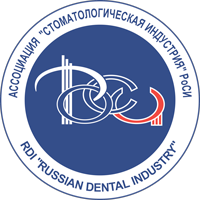DOI:
10.37988/1811-153X_2024_4_166Assessment of cytokine status in patients with alveolitis
Downloads
Abstract
Alveolitis is a common complication of inflammatory nature that occurs after tooth extraction and is accompanied by painful symptom in the area of the extracted tooth cavity. There is a significant number of factors contributing to the development of alveolitis, including the presence of somatic pathology. The aim of the study was to determine the concentration of anti-inflammatory cytokines (IL-1β, IL-6, TNF-α) in the oral fluid of patients with serous alveolitis and in practically healthy people.Materials and methods.
90 patients aged from 18 to 66 years (mean age — 41.3±1.4 years) were examined and divided into 2 groups: I (comparison) — 30 practically healthy people; II — 60 patients with serous alveolitis (main group). The clinical part included anamnesis collection, examination of the oral cavity and the well of the extracted tooth. Additional methods of research — radiography and oral fluid sampling for determination of IL-1β, IL-6 and TNF-α concentrations.
Results.
In all patients of group II the concentration of cytokines was significantly higher than in the comparison group (p<0,001). Among practically healthy people only IL-6 secretion depended on gender (p<0,01). The level of cytokines in saliva was affected by age and chronic diseases of internal organs (p<0.05). Group II patients under 35—38 years of age had 316.4±7.2 pg/mL IL-1β, 39.86±0.3 pg/mL IL-6 and 252.3±12 pg/mL TNF-α in saliva. Regression analysis confirms the direct dependence of the concentration of the studied cytokines on sex, age and the presence of chronic diseases of internal organs (p<0.05).
Conclusion.
The concentrations of cytokines are elevated in patients with serous alveolitis compared to practically healthy people (p<0.001). Women under 42 years of age are more susceptible to alveolitis (62%) than men (38%). This fact can be explained by the fact that in women during the period of hormonal changes the level of female sex hormones is increased, which affect the fibrinolysis of the blood clot. In men, on the contrary, after 42 years of age, the risk of alveolitis increases, this fact is explained by poor oral hygiene and motivation for better oral care, as well as bad habits. In patients with serous alveolitis and chronic diseases of internal organs from 1 year and more than 5 years, the concentrations of cytokines increase, which indicates a direct correlation of these factors according to the results of regression analysis (p<0.05).
Key words:
alveolitis of the extracted tooth socket, oral fluid, cytokinesFor Citation
[1]
Tchaikovskaya I.V., Dengina E.B., Komarevskaya E.V., Shelykova I.P. Assessment of cytokine status in patients with alveolitis. Clinical Dentistry (Russia). 2024; 27 (4): 166—170. DOI: 10.37988/1811-153X_2024_4_166
References
- Isik B.K., Gürses G., Menziletoglu D. Acutely infected teeth: to extract or not to extract? Braz Oral Res. 2018; 32: e124. PMID: 30540102
- Robustova T.G., Iordanishvili A.K., Lyskov N.V. Prevention of infectious inflammatory complications after the operation of the tooth extraction. Parodontologiya. 2018; 2 (87): 58—61 (In Russian). eLIBRARY ID: 35786799
- Stefantsov N.M., Zhelanov D.V. Alveolite. The frequency of complications according to official statistics of municipal dental clinics and offices. Bulletin of the Smolensk State Medical Academy. 2009; 4: 76—78 (InRussian.
- Garagha N.G. A modern view on the treatment of alveolitis in surgical dental practice. Actual research. 2023; 44—1 (174): 45—47 (In Russian). eLIBRARY ID: 54773602
- Nesterov A., Sadykov M., Chigarina S., Haykin M., Trunin D. The results of periodontal aid for patients with periodontosis in samara state dentistry clinics (terms and conditions). Actual Problems in Dentistry. 2020; 1: 75—80 (In Russian). eLIBRARY ID: 42817253
- Schafer C.A., Schafer J.J., Yakob M., Lima P., Camargo P., Wong D.T. Saliva diagnostics: utilizing oral fluids to determine health status. Monogr Oral Sci. 2014; 24: 88—98. PMID: 24862597
- Del Corso M., Toffler M., Ehrenfest D.M. Use of autologous leukocyte and platelet rich fibrin (L-PRF) membrane in post avulsion sites: an overview of Choukroun’s PRF. The Journal of Implant & Advanced Clinical Dentistry. 2010; 1: 27—35.
- Rybovalov M.V., Pavlenko T.A. Cytokine status of the oral fluid in periodontitis in patients with a survey of coronavirus infection. Clinical Dentistry (Russia). 2022; 2: 45—49 (In Russian). eLIBRARY ID: 48679074
- Maylyan E.A., Chaykovskaya I.V., Soboleva A.A., Lesnichenko D.A., Kostetskaya N.I. Levels of several cytokines in serum and oral fluid in postmenopausal women with chronic generalized periodontitis and osteoporosis. Challenges in Modern Medicine. 2021; 1: 79—91 (In Russian). eLIBRARY ID: 45644326
- Mirzakulova U.R., Agibaeva G.A. The results of the treatment of alveolitis of the tooth hole using alvogyl paste. Bulletin of the Kazakh National Medical University. 2019; 1: 251—254 (In Russian). eLIBRARY ID: 39394468
- Trifonov B.V., Ovchinnikov I.V. The evolution of alveolitis jaws treatments. Belgorod State University Scientific bulletin: Medicine, Pharmacy. 2011; 16—1 (111): 161—164 (In Russian). eLIBRARY ID: 20359743
Downloads
Received
January 13, 2024
Accepted
October 16, 2024
Published on
December 17, 2024










